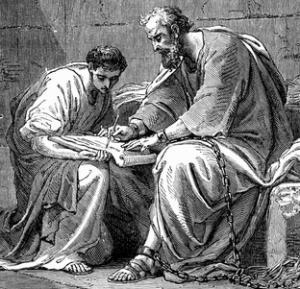 While some books of the Bible can be neatly outlined, others are not while nonetheless being clearly understandable. In 2 Timothy, there are certainly the clear and repeated themes for Timothy to suffer, preach the Word, and be faithful in his ministry (1:8, 13–14; 2:1–3, 14–15; 3:14–17; 4:1–5), especially in the midst of gospel opponents (2:15–18, 22–26; 3:1–9; 4:14–15). The letter’s body revolves around these themes and others (1:3–4:18), bookended by an obvious introduction and conclusion (1:1–2; 4:19–22).
While some books of the Bible can be neatly outlined, others are not while nonetheless being clearly understandable. In 2 Timothy, there are certainly the clear and repeated themes for Timothy to suffer, preach the Word, and be faithful in his ministry (1:8, 13–14; 2:1–3, 14–15; 3:14–17; 4:1–5), especially in the midst of gospel opponents (2:15–18, 22–26; 3:1–9; 4:14–15). The letter’s body revolves around these themes and others (1:3–4:18), bookended by an obvious introduction and conclusion (1:1–2; 4:19–22).
After an introduction (1:1–2), the first section of 2 Timothy includes Paul’s thankfulness and instructions for Timothy (1:3–18). After giving thanks for Timothy and encouraging him to teach (1:3–7), Paul exhorted Timothy to suffer for the gospel (1:8–12) and guard the good deposit of the gospel entrusted to him (1:13–18).
Paul then gives a number of pictures of service for Timothy in order to reinforce Timothy’s faithfulness to his ministry (2:1–26). He is to teach and suffer as a solder, athlete, and farmer (2:1–7), as motivated by Christ’s salvation to those he would serve (2:8–13), and to do so as a diligent workman, cleansed vessel, and man of God (2:14–26).
Paul again charges Timothy to faithful ministry (3:1–4:8) by promising the presence of ungodly people in these last days (3:1–9), reminding Timothy how he differs from them (3:10–17), and charging Timothy before divine witnesses to preach the Word, especially in light of Paul’s soon departure (4:1–8).
In bringing the book to an end, Paul requests Timothy to bring some things to him in prison and gives a report of his trial before the Roman authorities (4:9–18). Greetings are given and requested, and the book closes with prayers for Timothy and the rest in Ephesus (4:19–22).
Here are some recommended commentaries, ranging from shorter to longer works:
- A short commentary: Andreas Köstenberger, “2 Timothy,” pp. 563–600 in Ephesians–Philemon (Expositor’s Bible Commentary, Volume 12; Grand Rapids, MI: Zondervan, 2006)
- A little bit longer commentary: Edmond Hiebert, Second Timothy (Everyman’s Bible Commentary; Chicago: Moody, 1967)
- A longer commentary: William D. Mounce’ Pastoral Epistles (Word Biblical Commentary, Volume 46; Dallas: Word, 2000)
- Another longer commentary: Andreas Köstenberger, Commentary on 1–2 Timothy and Titus (Biblical Theology for Christian Proclamation; Nashville, TN: Broadman & Holman, forthcoming, May 1, 2017)
About David Huffstutler
David pastors First Baptist Church in Rockford, IL, serves as a chaplain for his local police department, and teaches as adjunct faculty at Bob Jones University. David holds a Ph. D. in Applied Theology from Southeastern Baptist Theological Seminary. His concentration in Christian Leadership focuses his contributions to pastoral and practical theology.
